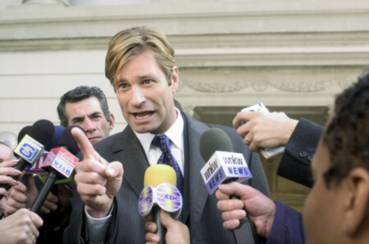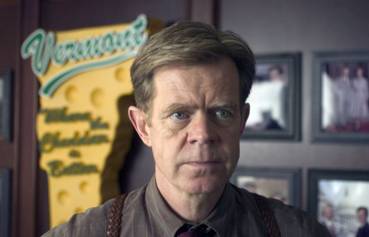|
Smoking
is a global industry. It makes billions of dollars every
year in America alone. The downside is that it kills 400,000
American people per year – that's about 1,200 per day. You'd
be hard pressed to find anyone willing to go up in front
of an audience and promote smoking, but somebody has to
do it. And in this case, that somebody is professional spin-doctor
Nick Naylor. Thank You For Smoking centres around
Nick (Aaron Eckhart), who is paid to promote an industry
that most people can't find two good words to say anything
about. In the opening scene of the film, a public health
spokesman accuses the tobacco industry of wanting a cancer-stricken
young boy to die. Cool as a cucumber, Nick replies, "If
he dies, we lose him as a customer. We want kids alive and
smoking."
Nick's
a smooth talker. As he monologues to the camera, "Michael
Jordan plays basketball; Charles Manson kills people; I
talk." It's what he's good at; he can take any idea in the
world and sell it to anyone who'll listen. In fact, he's
not really interested in the tobacco industry's ups and
downs; he just works for them and sells them to the media,
providing an opposing viewpoint to the health-conscious
critics. Thank You is one of those rare comedy-dramas
that takes the viewer in so deep, they don't know whether
to laugh at Nick's incredible feats of bullshit or take
his views seriously.

The
main plot of the film has Nick getting ready for acongressional
hearing over Senator Finistirre (William H. Macy)'s campaign
to put a large skull-and-crossbones image on every cigarette
package, in an attempt to educate people (especially teenagers)
of the dangers of smoking. Naturally, Big Tobacco is worried
about their profits, and brings Nick in to counter the negative
press that this move will bring. Nick has problems of his
own – he's trying to be a good father to his son Joey (Cameron
Bright), whom he's got joint custody of from his estranged
wife (Kim Dickens). Nick takes Joey with him on business
trips, and teaches him about winning arguments and debates
with his personal philosophy – present a good argument,
and you're never wrong.
Even
though Thank You is focused on the issue of smoking,
it never really comes off as pro-smoking – that's just the
prevalent theme, used by the story to provide a backdrop
to Nick's actions. You know that Nick would be just as good
a speaker on any other subject. Tellingly, although one
major plot point has Nick going to a movie producer in an
attempt to bring casual smoking back to the big screen,
observant viewers will note that none of the characters
in the movie ever light up a cigarette on-camera. This isn't
a case of Hollywood squeamishness over promoting smoking
– they might as well have vetoed the entire film – it's
a directorial decision, which adds to the film's satire.
Thank
You is funny because its satire (through Nick) is very
close to the PR practices of the real Big Tobacco. To tell
a sympathetic tale about the dangers of smoking would be
pointless; instead, the movie acknowledges that smoking
has its dangers, and quickly moves away from the issue,
turning even the most rational debates against smoking into
points in its favour. During the congressional debate over
the cigarette packaging, Nick turns Senator Finistirre's
game of numbers into an attack on Vermont's cheese – cholesterol
kills far more people per year than even cigarettes – forcing
the beleaguered Senator to splutter "Vermont will not apologize
for its cheese!"
Bringing
up the rear are Nick's closest friends, the self-proclaimed
"Merchants of Death" – Bobby (David Koechner, best remembered
as the sports commentator from Anchorman) and Polly
(Maria Bello), who represent the firearms and alcohol industries
respectively. The three lobbyists meet every week for lunch;
one of the funniest scenes of the movie sees them arguing
with each other over which of their industries causes the
most deaths per year. Nick, Bobby and Polly have a kind
of mutual camaraderie; all three know that their jobs demonise
them in the eyes of the whole world, but all continue to
do it because, as Nick puts it, "Everyone has a mortgage
to pay."

As
you'd expect from a satirical film such as this, the soundtrack
is comprised of songs that are entirely appropriate, kicking
off with "Smoke, Smoke, Smoke That Cigarette", continuing
through the movie with "Smoke Rings", and finishing up with
"Greenback Dollar" over the ending credits. Although completely
expected, the placement of the songs – and their very relevant
lyrics – made me chuckle.
As
far as the acting goes, the movie (naturally) belongs to
Aaron Eckhart. This is the role he was born to play, far
surpassing his mediocre performance in Erin Brockovitch six years ago. Kudos also must be given to the great JK
Simmonds, who's starting to get a reputation as a cigar-chomping
hard-headed executive after his similar role as J. Jonah
Jameson in the Spider-Man movies – here, he plays
Nick's boss, who takes orders directly from the heads of
Big Tobacco and claims most of Nick's ideas as his own.
One part that let me down somewhat was Katie Holmes' appearance
as journalist Heather Holloway, who has a whirlwind affair
with Nick in a cynical (and totally signposted) attempt
to extract all of his secrets and air them in public. Holmes
doesn't have any real purpose other than this; she's completely
hollow. An honourary mention goes to Cameron Bright, who's
becoming one of the most recognisable child actors of the
decade.
At
the end of the day, whether you're pro-smoking or anti-smoking, Thank You For Smoking – taking jabs at both sides
of the argument – is a welcome breath of fresh air; a movie
with an unorthodox message that isn't afraid to be politically
incorrect when it has to, and avoids falling too far into
the shmaltzy "separated dad bonds with son" stereotype that's
all too prevalent in mainstream movies. I rate this movie
as one of my favourite satires of the year – it's witty
in all the right places, and never soapboxes or picks sides.
Is smoking good or bad? In the end, as far as this movie's
concerned, it really doesn't matter.
|